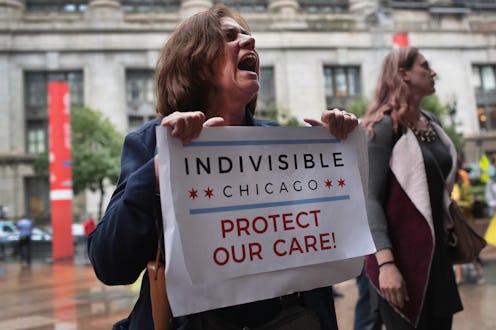News
The New CBO Score On An Obamacare Repeal Spells Catastrophe

The Congressional Budget Office announced on Wednesday that if the Senate's Obamacare repeal bill were to pass, an additional 32 million Americans would lose their insurance by 2026. Senate Majority Leader Mitch McConnell proposed the "repeal with no replacement" tactic after Republicans' latest iteration of their health care bill crumbled on Monday.
Senate Republicans' plan to repeal Obamacare seemed DOA earlier this week when, barely hours after McConnell announced that the Senate would vote on a bill to do away with much of the provisions of Obamacare with no plan in effect to replace them, senators on both sides of the aisle unleashed their fury at the last-ditch effort to make good on a seven-year long campaign promise. But on Wednesday McConnell forged ahead, announcing that the Senate would vote to begin debate on the repeal bill early next week, perhaps spurred by President Trump's request that the Senate produce some form of health care legislation before the August recess.
The CBO report backs up much of what dissenting senators have said about the prospect of repealing the Affordable Care Act while offering no replacement. The report says that the repeal would cause skyrocketing premium costs, and would lead to the majority of Americans being unable to afford to purchase individual health care plans.
In the next year alone, the report says that 17 million people would lose their insurance, compared to if the current laws remained in effect. In 2020, the number of uninsured would increase to 27 million, due to the elimination of the Medicaid expansion provision of the ACA and the loss of subsidies for plans purchased through the ACA marketplaces. The number of uninsured would continue to soar to 32 million in 2026.
It would be the extreme increase in premiums that would put insurance financially out of reach for many Americans. The CBO report says that on average, premiums for individual policies— or those not purchased through an employer— would increase by 25 percent by next year. By 2020, premiums will have increased by 50 percent, and they would continue to rise, doubling by 2026.
And if cost wasn’t enough to put you out of the running to purchase health insurance, location might. The CBO estimates that under the repeal bill, half of the American population would live in areas that by 2020 would have no insurers providing the option to purchase an individual policy. Providers would move out of the nongroup market— or individual policies— because enrollment would continue to drop and premiums would continue to rise. The trend would continue, and the lack of available coverage would extend to about three-quarters of the total population by 2026.
Theses numbers are clearly catastrophic, would upend the insurance industry and would turn the clock back on the monumental progress this country has made in medical access over the past seven years. Now it stands to be seen whether this report will give McConnell and Trump pause, and maybe convince them to try a different route when it comes to their unrelenting desire to repeal Obamacare.